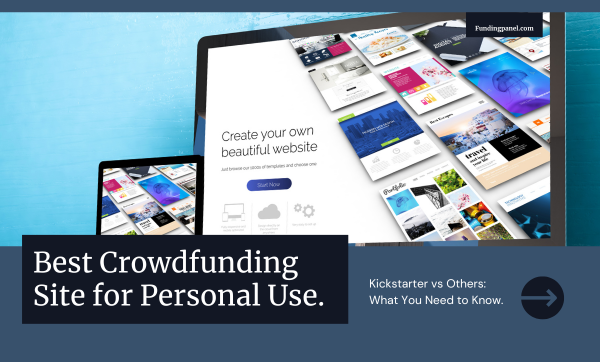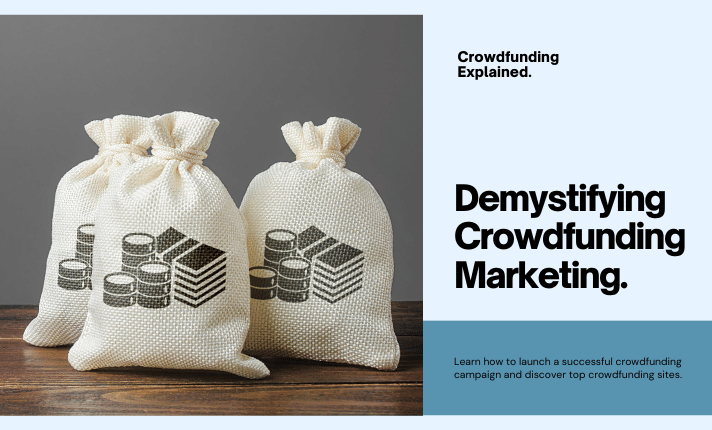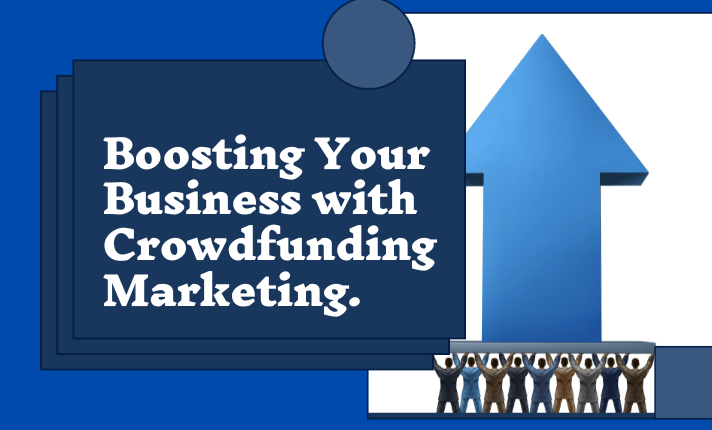Intro
Crowdfunding 101: Here at Crowdfunding 101, welcome! You’ve undoubtedly heard of “crowdfunding” if you’re an innovator or creative person trying to raise money for your next big idea. It’s a well-liked way to raise funds with the help of a significant number of people, usually through internet sites like Kickstarter. There are advantages and disadvantages to consider before diving into crowdfunding marketing, even though it has grown in popularity recently as a substitute for conventional funding methods. We’ll go over the benefits and drawbacks of crowdfunding in this blog post so you can decide if it’s the best course of action for your project. Now, let’s start and compare the benefits and drawbacks of crowdfunding and Kickstarter marketing!
Crowdfunding 101: Understanding the Concept of Crowdfunding
Crowdfunding works on a straightforward idea. People and organisations share their ideas and projects on websites like OrganizationStarter, Indiegogo, or GoFundMe. Frequently, they include a video pitch and a detailed description of their goals for the money they raise. They then established a budgetary target and a timeframe for achieving it. In crowdfunding, most people who contribute money to these projects are called the “crowd.” Crowdfunding is beautiful because it brings people together worldwide to invest in and support ideas they believe in. Depending on the kind of crowdfunding, rewards or equity may be exchanged for this. But it’s crucial to remember that, to draw in the right audience and win them over, a crowdfunding campaign’s success largely depends on its ability to market itself on Kickstarter or by hiring the best crowdfunding marketing company. Now that you know precisely how crowdfunding operates, let’s explore the benefits it can offer.
Crowdfunding 101: The Advantages of Crowdfunding
One of the most compelling advantages of crowdfunding is its democratization of finance. Instead of relying solely on traditional lenders or investors, crowdfunding enables anyone with a great idea to appeal directly to potential supporters. This broadens access to capital and can help level the playing field for underrepresented groups. Secondly, crowdfunding creates an early opportunity for market validation. If your idea resonates with a large group of people willing to back it financially, it indicates a market for your product or service. Its ability to provide visibility is another significant benefit. A buzz created by a successful crowdsourcing campaign can help your project get noticed by people outside your immediate network.
The community formed along the journey is more important than the money. They become your brand evangelists, product testers, and early adopters. Finally, there’s no need to take on debt or give up equity, depending on the kind of crowdfunding. You can obtain the required funding and still manage your project. Although there isn’t a one-size-fits-all solution, many creators and entrepreneurs find crowdfunding worth considering because of these benefits.
Crowdfunding 101: The Power of the Crowd – Community Engagement
Crowdfunding 101: By starting a crowdfunding campaign, you’re creating a community and raising money. Each backer joins you on this journey, experiencing the thrill and expectation of your project’s accomplishment together. High levels of engagement can result from this sense of teamwork, as supporters frequently become outspoken supporters of your project. They spread the word about your campaign on their networks, increasing its reach.
Additionally, they can offer insightful criticism to help refine your project’s course and ensure it appeals to your target audience. This engagement can be increased using efficient Kickstarter marketing or hiring the best crowdfunding marketing agency, transforming a backer base into a potent marketing force. But it’s crucial to remember that this interaction calls for reciprocal communication.
Crowdfunding 101: Providing regular updates to your supporters regarding the status of your project and promptly answering their questions can make the difference between an enthusiastic and supportive community and a disgruntled group of people. Using the crowd’s power means not only having their financial support but also their participation, loyalty, and trust.
Disadvantages of Crowdfunding: It’s Not Always a Surefire Success
Even though crowdfunding has benefits, it’s important to weigh any potential drawbacks as well. The risk of failure is one of the most important. Even the most exciting concepts might fall short of their funding target, leaving the project unfinished and the backers unhappy. Another area for improvement with crowdfunding platforms is their competitive nature. Making an impression when so many other projects are competing for the same attention can be difficult. Crowdfunding 101:
The success of your campaign also largely depends on efficient marketing. Your project’s chances of gaining traction are significantly reduced if your Kickstarter marketing plan fails. Crowdfunding can be a double-edged sword because it exposes your project to public scrutiny. Negative criticism may hinder the success of your campaign, but constructive criticism can help you refine your idea. The inherent pressure of fulfilling backer expectations comes last. After you receive funding, you have an obligation to fulfil your promises; any delays or non-fulfilment may harm your reputation. You must take these factors into account before starting your crowdfunding project.
Intellectual Property Risks in Crowdfunding
The risk to intellectual property (IP) is one of crowdfunding’s frequently disregarded drawbacks. Starting a campaign requires disclosing information to the public about your project or idea, which could attract copycats. Intellectual property protection, such as patents or trademarks, can reduce this risk, but obtaining them frequently requires time and money. Furthermore, even though a pending patent might deter some would-be imitators, total protection is not guaranteed. Additionally, remember that IP laws differ between countries, so only some markets can protect your idea. It’s vital to think carefully about how much information you wish to share about your product or service during your crowdfunding campaign.
It can be challenging to strike a balance between disclosing just enough information to interest potential backers and keeping your idea private to keep your idea confidential to avoid giving away too much to run the risk of having your idea stolen. Hiring a seasoned Kickstarter marketing company with knowledge of this field can assist you in navigating these complexities and safeguarding your creative concepts.
Crowdfunding: Weighing the Pros and Cons
Without a doubt, crowdfunding has enormous potential to support both community development and financial needs. It provides access to capital, visibility, and market validation without the usual obstacles or loss of control. An active community can broaden your audience, provide insightful criticism, and support your cause. It is with difficulties, though. The possibility of failure, rivalry, the requirement for efficient marketing, public scrutiny, and backer expectations adds complexity.
Not to mention the risk—which needs to be carefully considered—to your intellectual property; thus, it’s crucial to consider these benefits and drawbacks concerning your project before diving into crowdfunding. Consider your capacity to promote your campaign successfully, respond to public criticism, adhere to delivery schedules, and safeguard your original concepts. This careful approach can significantly improve your chances of successfully crowdsourcing projects and streamline the process. Recall that creating a network of devoted supporters invested in your success is just as important as raising money. Seize the chance, overcome the obstacles, and let your idea shine!











